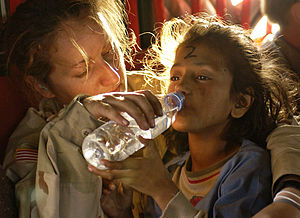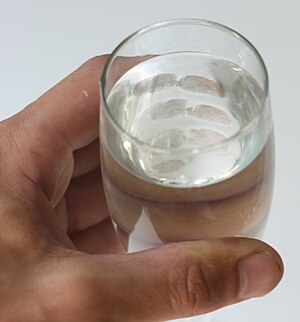| (Photo credit: Wikipedia) |
As the body can’t store water, we
need fresh supplies every day to make up for losses from lungs, skin,
urine and feces. Water is needed to maintain the health and integrity
of every cell in the body, keep the bloodstream liquid enough to flow
through blood vessels, help eliminate the by products of the body’s
metabolism, helps to flush out toxins, regulate body temperature
through sweating, lubricate and cushion joints and carry nutrients
and oxygen to the body’s cells, just to name a few. Drinking
refreshing, clean water plays a major role in reducing the risk of
certain diseases.
The loss of body water through
urination is greatly increased by the ingestion of caffeinated and
alcoholic beverages. These drinks have a diuretic effect, meaning
they stimulate the kidneys to excrete more urine. Not only do we lose
water, we also lose water-soluble vitamins, such as vitamin C,
vitamin B (thiamine) and other B complex vitamins. Some people think that drinking a Coke counts as water, but the truth is, for every
caffeinated or alcoholic beverage you drink, you need to add an
additional glass of pure water to your daily intake.
A diet containing lots of fruits and
vegetables will supply about 4 cups of water per day. But even with a
diet high in fruits and vegetables, it is still necessary to drink at least an
additional 4 to 6 cups of water per day to supply enough water to
meet the body’s daily needs (depending on daily activity levels and temperature).
| (Photo credit: Wikipedia) |
Approximately six to eight glasses of a variety of fluids can be consumed each day. More than eight glasses may be needed for physically active people, children, people in hot or humid environments, and breastfeeding women. Less water may be needed for sedentary people, older people, people in a cold environment or people who eat a lot of high water content foods. But either way, we can't get by without water, and there is no substitute!



No comments:
Post a Comment